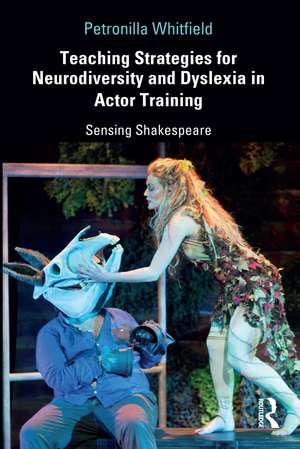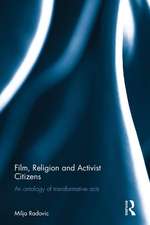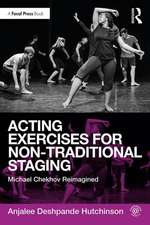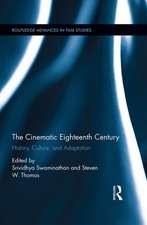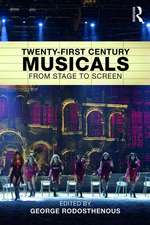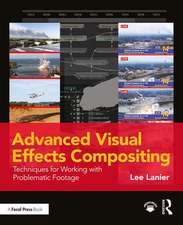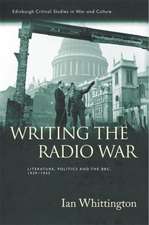Teaching Strategies for Neurodiversity and Dyslexia in Actor Training: Sensing Shakespeare
Autor Petronilla Whitfielden Limba Engleză Paperback – 12 aug 2019
The book offers six tested teaching strategies, created from practical and theoretical research investigations with dyslexic acting students, using the methodologies of case study and action research. Utilizing Shakespeare’s text as a laboratory of practice and drawing directly from the voices and practical work of the dyslexic students themselves, the book explores:
- the stress caused by dyslexia and how the teacher might ameliorate it through changes in their practice
- the theories and discourse surrounding the label of dyslexia
- the visual, kinaesthetic, and multisensory processing preferences demonstrated by some acting students assessed as dyslexic
- acting approaches for engaging with Shakespeare’s language, enabling those with dyslexia to develop their authentic voice and abilities
- a grounding of the words and the meaning of the text through embodied cognition, spatial awareness, and epistemic tools
- Stanislavski’s method of units and actions and how it can benefit and obstruct the student with dyslexia when working on Shakespeare
- Interpretive Mnemonics as a memory support and hermeneutic process, and the use of color and drawing towards an autonomy in live performance
| Toate formatele și edițiile | Preț | Express |
|---|---|---|
| Paperback (1) | 287.37 lei 6-8 săpt. | |
| Taylor & Francis – 12 aug 2019 | 287.37 lei 6-8 săpt. | |
| Hardback (1) | 1005.04 lei 6-8 săpt. | |
| Taylor & Francis – 12 aug 2019 | 1005.04 lei 6-8 săpt. |
Preț: 287.37 lei
Nou
Puncte Express: 431
Preț estimativ în valută:
54.99€ • 57.41$ • 45.51£
54.99€ • 57.41$ • 45.51£
Carte tipărită la comandă
Livrare economică 04-18 aprilie
Preluare comenzi: 021 569.72.76
Specificații
ISBN-13: 9781138311848
ISBN-10: 1138311847
Pagini: 232
Ilustrații: 1 Tables, black and white; 31 Illustrations, black and white
Dimensiuni: 152 x 229 x 25 mm
Greutate: 0.32 kg
Ediția:1
Editura: Taylor & Francis
Colecția Routledge
Locul publicării:Oxford, United Kingdom
ISBN-10: 1138311847
Pagini: 232
Ilustrații: 1 Tables, black and white; 31 Illustrations, black and white
Dimensiuni: 152 x 229 x 25 mm
Greutate: 0.32 kg
Ediția:1
Editura: Taylor & Francis
Colecția Routledge
Locul publicării:Oxford, United Kingdom
Cuprins
Part 1: The Background to the Investigatory Practice 1. Overview and structure of the book 2. Pedagogy and education in actor training: towards an emancipatory practice 3. David - the inspiration and initiator of my study 4. Matters of dyslexia 5. Shakespeare as laboratory and reader as creator Part 2: The Investigatory Practice and Teaching Strategies One to Six 6. The theoretical perspectives and methodology: attaining a verstehen through action research underpinned by case study 7. Finding the way in: picture thinking 8. Images as visible thought, acting stimulus and mnemonic pegs: Action Research (Cycle One) and Teaching Strategy One 9. The physical path and Stanislavski’s actions: action in pursuit of the objective or as an anchor of verbal meaning? 10. A trial of the physical actions method inspired by Stanislavski: Action Research (Cycle Two) and Teaching Strategy Two 11. Grasping towards being present in the text, entangling meaning into memory: Action Research (Cycle Three) and Teaching Strategy Three 12. The creation of mnemotechnics towards a memoria rerum (memory for things and ideas) and memoria verboram (memory for words) 13. The Micro and Macro strategy - deconstructing and reconstructing meaning and significance in Shakespeare’s text towards performance: Action Research (Cycle Four and Five) and Teaching Strategy Four and Five 14. Interpretive mnemonics, distributed cognition and authenticity of self: the research findings, Action Research (Cycle Six) and Teaching Strategy Six
Notă biografică
Dr. Petronilla Whitfield is Associate Professor in Voice and Acting at the Arts University Bournemouth, UK. She holds a PhD in Arts Pedagogy from Warwick University and an MA in Voice Studies from the Royal Central School of Speech and Drama. Trained originally as an actor at Arts Educational Schools, she was a professional actor for twenty years. She has taught voice and acting at leading British actor training institutions and universities for eighteen years.
Recenzii
"Teaching Strategies for Neurodiversity and Dyslexia by Dr. Petronilla Whitfield provides a valuable addition to the small but growing number of publications in the field of neurodiversity and actor training [...] the book works on several different levels. Not only does it provide an insight into teaching strategies for working with dyslexic students, it also provides teacher-researchers with an excellent model for a research methodology, and, for non-research based teachers, it provides a valuable case study of student-led learning with the teacher as collaborator [...] Whitfield advocates for an approach to actor training that is student-led and research-based and that is attentive to the diverse needs of students, and flexible and open to change. Whitfield’s own work is a fine example of this approach and stands as a valuable model for future pedagogies of voice."
- Daron Oram, Royal Central School of Speech and Drama, London, UK
"Whitfield’s book is so very valuable not only because she is one of a few focusing on dyslexia in actor training, but because this book contributes to a vastly underdeveloped research area in actor training overall. Throughout, her investigation is rigorous and her findings insightful. This book should be included on the reading list of every teacher-training program for theatre and drama."
- Tara McAllister-Viel, Theatre Topics, UK
"This landmark book will be a welcome addition to the toolkit of countless teachers and actor trainers who work with students with a range of learning needs, specifically those with dyslexia who are engaging with the texts of Shakespeare [...] the work done by Whitfield over many years and painstakingly documented in this book deserves commendation [...] As an educator who has worked and still works in more traditional learning environments where change is slow to come, though, I appreciate the immense value in the work documented in Whitfield’s book."
- Janet Gibson, Theatre, Dance and Performance Training
"This book sits in a wider emerging discourse on the neurodiversity of student performers, and its effect on the field of actor training. Whitfield’s contribution is important because not only does the subject matter have a far-reaching scope in that it looks to make the act of speaking Shakespeare more inclusive and engaging for those that might have previously been alienated by such, but it also serves as an accessible roadmap to conducting research within a pedagogical setting. It is incredibly useful not only for the teacher and the researcher, but also for the student; such is its accessibility."
- Denis Cryer-Lennon, University of South Wales, Journal of Interdisciplinary Voice Studies, Volume 5, Number 2
"In Teaching Strategies for Neurodiversity and Dyslexia in Actor Training – Sensing Shakespeare, Dr Whitfield offers the reader accessible neurodiversity/dyslexia and dramaturgical theory for drama and specific learning differences for educators to explore and connect to their teaching practice. […] Dr Whitfield’s research is a testament to the powerful role that multisensory strategies can play in strengthening memory and learning. It highlights the importance of promoting learner autonomy, inclusion, providing a social learning space, and a reminder that the learner is the expert of their learning processes."
- Denise Aitken, Dyslexia Review
- Daron Oram, Royal Central School of Speech and Drama, London, UK
"Whitfield’s book is so very valuable not only because she is one of a few focusing on dyslexia in actor training, but because this book contributes to a vastly underdeveloped research area in actor training overall. Throughout, her investigation is rigorous and her findings insightful. This book should be included on the reading list of every teacher-training program for theatre and drama."
- Tara McAllister-Viel, Theatre Topics, UK
"This landmark book will be a welcome addition to the toolkit of countless teachers and actor trainers who work with students with a range of learning needs, specifically those with dyslexia who are engaging with the texts of Shakespeare [...] the work done by Whitfield over many years and painstakingly documented in this book deserves commendation [...] As an educator who has worked and still works in more traditional learning environments where change is slow to come, though, I appreciate the immense value in the work documented in Whitfield’s book."
- Janet Gibson, Theatre, Dance and Performance Training
"This book sits in a wider emerging discourse on the neurodiversity of student performers, and its effect on the field of actor training. Whitfield’s contribution is important because not only does the subject matter have a far-reaching scope in that it looks to make the act of speaking Shakespeare more inclusive and engaging for those that might have previously been alienated by such, but it also serves as an accessible roadmap to conducting research within a pedagogical setting. It is incredibly useful not only for the teacher and the researcher, but also for the student; such is its accessibility."
- Denis Cryer-Lennon, University of South Wales, Journal of Interdisciplinary Voice Studies, Volume 5, Number 2
"In Teaching Strategies for Neurodiversity and Dyslexia in Actor Training – Sensing Shakespeare, Dr Whitfield offers the reader accessible neurodiversity/dyslexia and dramaturgical theory for drama and specific learning differences for educators to explore and connect to their teaching practice. […] Dr Whitfield’s research is a testament to the powerful role that multisensory strategies can play in strengthening memory and learning. It highlights the importance of promoting learner autonomy, inclusion, providing a social learning space, and a reminder that the learner is the expert of their learning processes."
- Denise Aitken, Dyslexia Review
Descriere
Teaching Strategies for Neurodiversity and Dyslexia in Actor Training addresses some of the challenges met by acting students with dyslexia and highlights the abilities demonstrated by individuals with specific learning differences in actor training.
